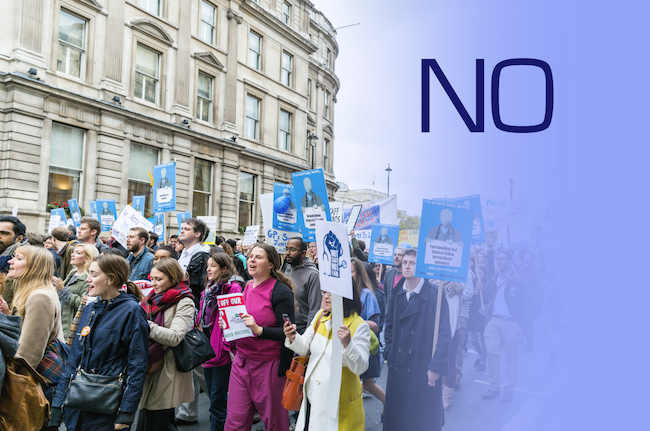Debate: To strike or not to strike? (Part 2)
 Junior doctor members of the BMA are voting on industrial action over the new contract proposed by the government. Needless to say there is a range of opinion among CMF members on the subject. So we asked two of our members to help us by sharing opposing views.
Junior doctor members of the BMA are voting on industrial action over the new contract proposed by the government. Needless to say there is a range of opinion among CMF members on the subject. So we asked two of our members to help us by sharing opposing views.
These articles were commissioned for the forthcoming issue of Triple Helix. However, we thought it would make sense to publish this here to help members prayerfully consider their position.
Join the conversation in the comments below, remembering the principle: ‘In essentials, unity; in non-essentials, liberty; in all things, charity’.
John Martin, CMF Head of Communications
No: ‘We need a different message’
I need to make something clear. Although I was a junior doctor for seven years, a year ago I rescinded my licence to practise and I am now in my third year at Oak Hill Theological College.
So it is with trepidation that I write as one no longer ‘on the pitch’. Please don’t hear me as an idealist who has lost touch with reality. Rather I am one standing on the sidelines shouting as loud support as I can muster, urging you on to know, love and serve Christ and to call others to him for his glory – not just as my former colleagues but as my current brothers and sisters in Christ.
So what would be the nature of my ‘loud support’ to junior doctors under the cosh? Answer: keep faithfully serving Jesus, keep loving your patients, and keep giving an answer for the hope that you have even as those around you become more despondent and angry.
But don’t strike.
I could give a number of reasons. The imperative to be there to show compassion to your patient. The importance not to cause harm (even indirectly). The importance of understanding communication break-down – attempting to understand our opponents’ reasons for struggling to hear us and our reasons for not listening to them before we accuse them of not listening (could there be a log in my eye?).
But, Bible college student that I am, indulge me in choosing this: the work and example of Jesus.
Two thousand years ago Peter wrote a letter to a group of Christians under the cosh. Some were suffering for doing good. Others, like the slaves in 1 Peter 2, were suffering despite doing good. So Peter speaks to these Christian slaves, not because he approved of their situation but because it was their situation and they needed to know how to live in it. Here’s what he said:
‘Slaves, in reverent fear of God submit yourselves to your masters, not only to those who are good and considerate, but also to those who are harsh.’ (1 Peter 2:18)
Now, you might be thinking, ‘hang on, we’re not slaves.’ Exactly. Imagine their situation for a minute. Not ‘persons,’ but property. Not workers, but ‘tools’. Some had good masters. Some had harsh masters. I can’t begin to imagine what that meant. Constantly belittled, treated as vermin, beaten for no reason. And yet Peter calls them to submit nonetheless.
Our reaction to this is complex. We are children of our generation but we try to understand how the Bible teaches us. This means that we rightly recoil at the treatment Peter describes, or at the very idea of owning slaves. But those are not the issues Peter is addressing. Rather, he wants to tell those people in that situation what they should do in response. If we recoil at his command to submit to masters, even the harsh ones, we find ourselves on the side of our entitlement-driven culture, recoiling not at human injustice but at God’s word. That’s dangerous ground.
So we need to understand how Peter can say this, let alone expect these poor slaves to live it. Here’s his reason:
‘To this you were called, because Christ suffered for you, leaving you an example, that you should follow in his steps.’ (1 Peter 2:21)
Why should we? ‘Because Christ suffered the same way on your behalf and as your example,’ Peter answers. These slaves are followers of a different master. A master who enacted the supreme example of unjust suffering, offering no retaliation (1 Peter 2:23). Why? So that these slaves could be called to follow him. Jesus’ unjust suffering on our behalf is the very reason he can call us to imitate him by enduring unjust suffering ourselves. And the real punch is in how he did it:
‘He entrusted himself to him who judges justly’ (1 Peter 2:23b)
So he doesn’t call harshly treated slaves – even unfairly treated employees – to simply endure, but to hope in the final vindication of believers under the cosh. Read through 1 Peter and count the number of times this vindication is in view. He can’t point to it enough! It’s real, it’s the reason Christians can behave in this radical way, and it’s the thing Peter consistently calls us to point to – ‘the hope’ that we have (1 Peter 3:15–16).
My biggest concern is that in all the protesting and social media, there has not been significant difference between the rhetoric of Christian and non-Christian medics. Please don’t be silent, but please don’t melt into the crowd. At this moment of highly charged emotions the world around you needs, not your joining a strike, but your pointing to the Lord Jesus, your only possible source of hope amidst the pressures of medicine in 2015 and beyond. Your colleagues, your patients, and those looking in from the outside need to see and hear a group of juniors with a different message. One of self-sacrifice and responsibility versus entitlement. Yes, one even of submission. Supremely, one of a crucified saviour who suffered for us, leaving us an example, that by his power we might walk in it.
So from the sidelines I shout: ’Point to him!’.
Matt Lillicrap is a former doctor now training for pastoral ministry.












Leave a Reply
Want to join the discussion?Feel free to contribute!